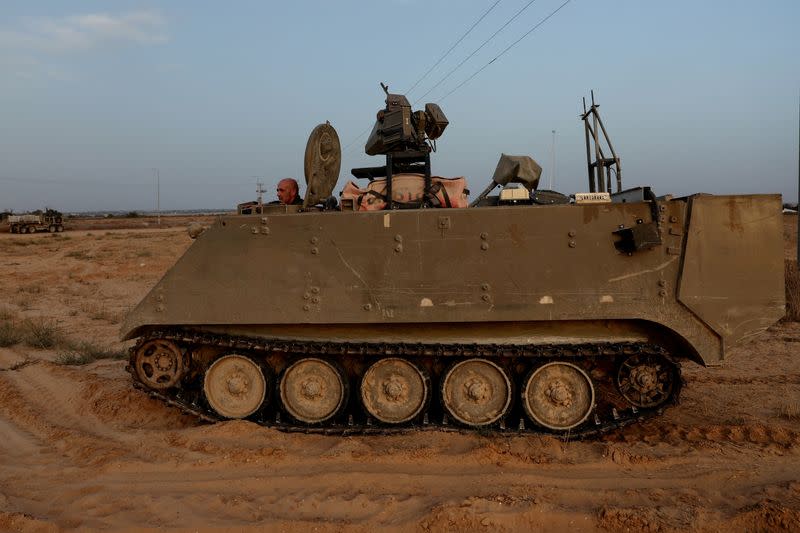Israel vows to broaden Rafah sweep amid heavy fighting in parts of Gaza

By Nidal al-Mughrabi and Dan Williams
CAIRO/JERUSALEM (Reuters) - Israel made a new push in central Gaza on Monday, bombarded towns in the north of the Strip and said it intended to broaden its military operation in Rafah despite U.S. warnings of the risk of mass casualties in the southern city.
Gaza medics said at least 23 people had been killed in the latest fighting, and residents said battles were intense in Jabalia in the north of the Palestinian enclave.
Israeli tanks also carried out a limited incursion into areas of Wadi Al-Salqa and Al-Karara near Deir Al-Balah, a central Gazan city which Israeli forces have not entered during more than seven months of war, local residents said.
Fighting raged as U.S. National Security Adviser Jake Sullivan held talks in Israel which the White House had said he would call for Israeli forces to go after Hamas militants in Gaza in a targeted way, not with a full-scale assault on Rafah.
But Israeli Defence Minister Yoav Gallant signalled there would be no let-up in its operation, intended to clear Rafah of Hamas militants and rescue hostages seized in the Hamas-led raid on Israel on Oct. 7 that triggered the war.
"We are committed to broadening the ground operation in Rafah to the end of dismantling Hamas and recovering the hostages," a statement from Gallant's office quoted him as telling Sullivan.
Israel describes Rafah, on Gaza's border with Egypt, as Hamas' last stronghold. Western powers are concerned over the hundreds of thousands of displaced Palestinians sheltering there, despite Israeli assurances about humanitarian safeguards.
Israel told civilians to evacuate parts of the city on May 6 and began troop and tank incursions. The U.N. agency for Palestinian refugees UNRWA estimates that 810,000 people have fled since then, possibly over half Rafah's wartime population.
Israel's plan for an all-out assault on Rafah has ignited one of the biggest rifts in generations with its main ally, and Washington held up a weapons shipment over fears of large civilian casualties.
BATTLES IN HEART OF JABALIA
At least 35,000 Palestinians have been killed in the war in Gaza, according to the enclave's health ministry, and aid agencies have also warned of widespread hunger and dire shortages of fuel and medical supplies.
Some 1,200 people were killed and more than 250 taken hostage in the Oct. 7 rampage, according to Israeli tallies. About 125 people are believed to remain in captivity in Gaza. Israel's military says more than 280 soldiers have been killed in fighting since the first ground incursions in Gaza on Oct 20.
Fighting has been heavy in Jabalia, the largest of Gaza's eight historic refugee camps, for about 10 days. Battles are under way in the heart of the camp and in narrow alleys that Israeli forces had not previously entered, residents said.
The armed wings of Hamas and the allied group Islamic Jihad said their fighters had fired anti-tank rockets and mortar bombs at Israeli forces operating across Gaza, including in Rafah.
Hamas' armed wing said gun battles were taking place in eastern Rafah suburbs where videos circulating on social media, but not verified by Reuters, showed tanks outside some building in what would be new gains for the Israeli forces.
Talks mediated by Egypt and Qatar have failed to secure an end to the war.
Qatar's Minister of State at the Foreign Ministry, Mohammed Al-Khulaifi, said on Monday he saw no political will to reach a ceasefire agreement in Gaza while military operations continued on the ground.
Israel says it wants to reach a deal allowing for an exchange of hostages held in Gaza for Palestinians held in Israel, but has not committed to ending its offensive in Gaza.
Hamas, which as been running Gaza since 2007, says Israel must commit to ending the war and rejects any post-war settlement that excludes the group.
Israeli Prime Minister Benjamin Netanyahu is under growing pressure from within his own war cabinet to commit to an agreed vision for Gaza that would include stipulating who might rule the enclave after the conflict ends.
According to a poll aired on Israel's Channel 13 TV on Sunday, 41% of Israelis believe the Rafah operation will bring what Netanyahu has described as "total victory" closer, while 46% do not believe that.
(Editing by Timothy Heritage)
